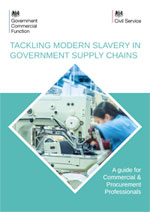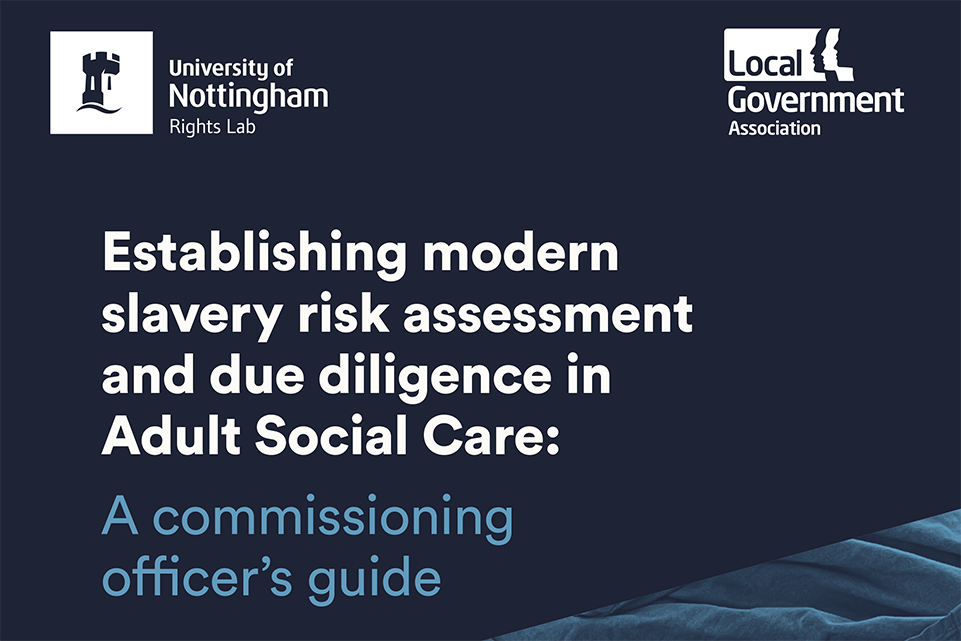Councils are uniquely placed to be at the forefront of the fight against modern slavery, and are demonstrating awareness and ethical leadership by voluntarily completing modern slavery transparency statements.
Introduction
Procurement of services is an important part of councils’ expenditure with, local government third party revenue expenditure totalling around £60 billion a year. Understanding our supply chains and assessing the risk to those working in it is not easy and requires commitment, support and collaboration.
The Transparency in Supply Chains Provision (TISC, s.54) of the Modern Slavery Act (MSA) requires commercial entities with an annual turnover of £36m or more to report annually on their actions to identify, prevent and mitigate modern slavery in their supply chain.
Councils are currently under no legal obligation to publish statements in compliance with the Section 54 provision but this is soon about to change with the Government’s announcement that public sector organisations, including local authorities and Fire and Rescue Services with a budget of £36m and above, will be included in the new provisions of the Modern Slavery Act when it is updated and amended later this year. The LGA also welcomes clarifications of the reporting requirements and the new online registry, which the sector has been actively involved with in the development stages.
Councils are uniquely placed with the wide range of goods and services that we procure placing us the forefront of the fight against modern slavery - around 140 councils have already voluntarily compiled the transparency statements. The LGA is encouraging others to follow suit with a range of guidance and support for those wishing to submit a statement, including a simple aide memoire and a dynamic list of links to published council transparency statements.
LGA modern slavery assurance guidance – construction
Local authorities undertake a significant volume of construction work ranging from programmes of repair and maintenance to major refurbishment and new build projects across a host of different sectors including schools, social care, housing, infrastructure and highways. It is therefore crucial that councils use their spending power to ensure that their supply chain is behaving responsibly and identifying and combatting instances of exploitation wherever it may be found in the supply chain tiers.
To address exploitation effectively it is essential that organisations take a risk-based approach to procurement. Whilst construction as a sector is considered high risk for modern slavery, the risks are found within specific materials and work packages which need to be identified by any procurement team before any requirements are set.
This guidance document has been developed to support procurement teams within local authorities embed requirements through the procurement process to identify and combat exploitation and slavery wherever it may be found.
It has been developed to outline all key activities that are associated with good procurement and provide advice, examples, and links to appropriate resources that will allow procurement teams to integrate requirements as effectively as possible.
Modern Slavery in public sector supply chain – e-learning course
As part of Government’s efforts to tackling modern slavery in global supply chains, the Home Office’s Modern Slavery Unit and Joint Security and Resilience Centre have produced an e-learning course for public sector commercial staff on the practical steps they can take throughout the commercial lifecycle to identify and mitigate modern slavery risks.
The e-learning course should give users a strong set of skills to:
- Recognise how modern slavery can manifest in supply chains.
- Spot modern slavery risks in procurement and critically interrogate the assurances suppliers provide (such as social audits).
- Drive improvements in modern slavery due diligence to create better outcomes for workers.
The access to this course is funded by the Government Commercial College (GCC), and it is at nil cost to learners. The e-learning is available to public sector staff who have access to the GCC website.
The e-learning guides users through a fictional personal protective equipment (PPE) procurement as a case study but the learning is applicable to staff working on other types of procurement. You can also find the associated guidance documents designed for buyers and suppliers of PPE.
Modern slavery risks for care workers – COVID-19
The COVID-19 pandemic has placed a significant strain on the care sector and there is increasing concern that there may be increasing risk of modern slavery in the recruitment of care workers. Risk factors include the shift to recruit online, rather than face-to-face, which may disguise the signals for which staff are trained to look. Nottingham Rights Lab, who work closely with the LGA have published a research briefing (pdf) note with some really helpful and practical recommendations for local authority commissioners. The Rights Lab have also published the full report; Assessing the vulnerability of care-workers in England to modern slavery risks during the COVID-19 pandemic.
Tackling modern slavery in Government supply chains
This guide is aimed at procurement and commercial practitioners at all levels who are operating in the public sector and is published, having consulted with the sector, with the support of the LGA. It advocates a risk-based approach to tackling modern slavery in government supply chains and contains guidance that can be applied to the local government sector.
Bradford City Council - Procurement portfolio for Modern Slavery risk – an analytic report
Nottingham Rights Lab have carried out a deep dive on Bradford’s Tier 1 suppliers and examines incidences of Modern Slavery in the Yorkshire and Humber region, one in construction, the other in retail manufacturing. The report focuses on their spend categories in more detail (pdf), breaking down and explaining the key Modern Slavery risks based on Rights Lab expertise. The report give expands on the recommendations to illustrate how Bradford City Council can move forwards in their journey to manage and tackle the modern slavery risks they face.
Councils from across the political spectrum have signed up to the Co-operative Party's council charter against modern slavery. Councils are leading the way with a new Charter to ensure exploitation has no place in their supply chains. The Co-operative Party's Charter against Modern Slavery goes further than existing law and guidance, committing councils to proactively vetting their own supply chain to ensure no instances of modern slavery are taking place.
The Modern Slavery Act 2015 made the UK the first country in the world to require organisations to publicy report on the steps that they are taking to prevent modern slavery in their operations and supply chains. In July 2018, the Home Secretary commissioned the Independent Review of the Modern Slavery Act 2015. The final review report was published in May 2019, recommending measures such as clarifying the scope of the organisations required to report and extending the requirement to report to public sector organisations (including councils). The LGA welcomes this consultation and many of the recommendations in the Independent Review. Read our response.
Featured pages
Further resources on modern slavery
There are numerous organisations working to tackle modern slavery in the UK and many resources available.
Ethical Trading Initiative: modern slavery statements evaluation framework
A framework to help structure, develop and benchmark your statement.
SAFERjobs
Working hard to prevent labour market exploitation, reducing recruitment fraud, job scams, recruitment company abuse or modern slavery


